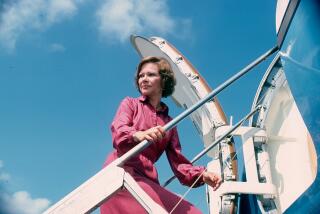Egypt’s First Lady Helps Out Children in Slums : Social services: Suzanne Mubarak began helping the poor after a dare from a college professor. Much of her attention is focused on eradicating illiteracy.
- Share via
CAIRO — It took Suzanne Mubarak a year after her husband became president to decide what kind of first lady she wanted to be. Then she accepted the challenge of an American professor and went into the slums.
For eight years, she has worked among her country’s teeming poor to bring education and hope to impoverished children. Mubarak describes herself as a “hands-on social worker.”
She has done the job largely without fanfare, opening schools and small libraries, obtaining medical supplies and hospitals for those without them. Much of her attention is focused on eradicating illiteracy, which afflicts more than half the 55 million Egyptians.
“I go to the most depressed area, the most depressed school, the most depressed hospital, but I don’t get depressed,” she said. “When I see what’s been done, the smiles of the children . . . if you can solve the worst case, surely the rest will follow.”
Mubarak calls her slum projects “self-help.” People who are inspired to help themselves “are filled with pride and go on from there,” she said. “You don’t feel like keeping a place clean if its walls are falling in.”
Seated on the lawn of Aruba Palace, a presidential guest house, she spoke of her goals for Egypt and her life as first lady, wife and mother of two grown sons. Politics was the only subject declared off-limits for her first lengthy interview since 1985.
“People say I’m shy, but I don’t think so,” she said. “I would say I’m just a bit timid.”
To the outside world, and most Egyptians, Mubarak is a mystery.
She is not a daily fixture in Cairo’s government newspapers. Her activities seldom were mentioned at all until the late 1980s, reportedly because she and her husband, President Hosni Mubarak, wanted it that way.
The president was said to be anxious that his wife not arouse resentment among the conservative Egyptians as the flamboyant Jihan Sadat had done. Still, Mrs. Mubarak often is compared to her predecessor, whose husband Anwar Sadat’s assassination Oct. 6, 1981, elevated Mubarak from vice president.
They have addressed many of the same problems, relating to the state of women, education, overpopulation and poverty.
“We’re both Egyptians, so if we do things differently, it’s a matter of style,” Mrs. Mubarak said. “The problems we’ve tried to solve are still with us.
“I can’t work in big crowds, in the limelight,” she said. “When I cut a ribbon at a school, I’ve been there 20 times before, improving the building, buying the books, training the teachers, talking with the children and visiting parents in their homes. It’s a project I created with the help of private donations.”
Jihan Sadat was known as an advocate of women’s rights in a male-dominated region.
In Mrs. Mubarak’s view, “At the moment there are enough laws on the books of Egypt that give women equal rights, but women have to know how to use them. It’s a social and educational challenge.”
When her husband became president, she said, “it took me one full year to find in myself what was right for me as first lady.”
Born Suzanne Thabet, daughter of an Egyptian doctor and a Welsh nurse, she was 17 when she married Capt. Hosni Mubarak, an air force flight instructor.
“He was so handsome,” said Mrs. Mubarak, now 49. “He still is.”
For 10 years she kept to the traditional role of housewife and mother to sons Alaa and Gamal.
“It was very difficult, because there were so many wars,” she said. “My husband was always gone. I gave my life to the boys.”
The day came when both were in school, and Mubarak asked herself, “What do I do now?” Relatives and friends counseled cooking or sewing classes. ‘I hate those things,” she said.
She enrolled in American University in Cairo. In 1977, when her husband was vice president, she graduated in political science with a minor in psychology. He was president in 1982 when she earned a master’s in sociology.
Mubarak said a classroom experience changed her life.
“We had this moody American psychology professor, who was working with children in the Bulaq slums of Cairo,” she said. “One day, he came in and lashed out at us. He said he bet we’d never been in Bulaq to see how conditions are for children, that we only passed by in our Mercedeses.”
After class, Mubarak visited him. “I said if he felt this way, why didn’t he show us how to help the children?” she said. “He told me, ‘Go and find your own way.’
“I took it as a challenge, and I did.”
She asked officials for a list of the five worst schools in Bulaq, then led a small group of women to each. She chose the worst of the worst for herself and wrote her master’s thesis on how a self-help program improved it and could do the same for others.
The first lady and her women volunteers now care for “45 schools, and counting. But I’ve moved on to include children’s libraries, hospitals, handicapped centers, everything you can name.”
Some of Egypt’s problems are so huge that one person cannot solve them, she said, but being first lady lets her try and rewards her when she succeeds.
More to Read
Sign up for Essential California
The most important California stories and recommendations in your inbox every morning.
You may occasionally receive promotional content from the Los Angeles Times.










